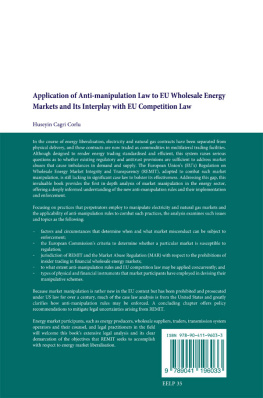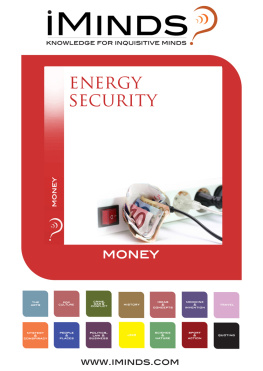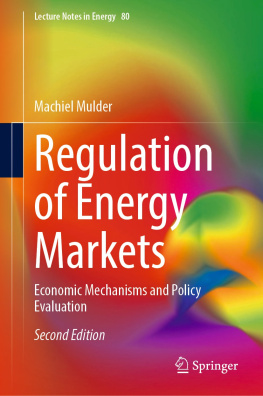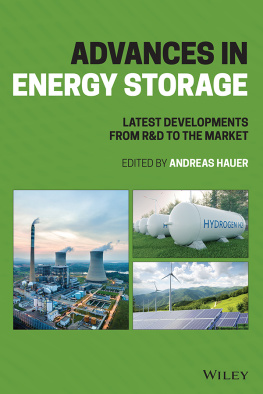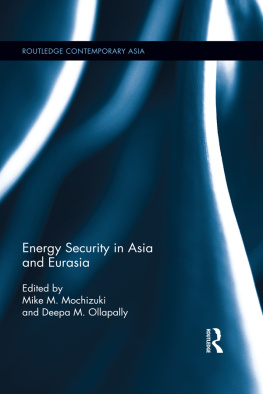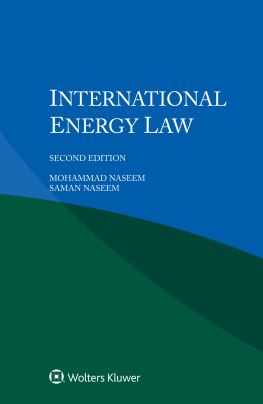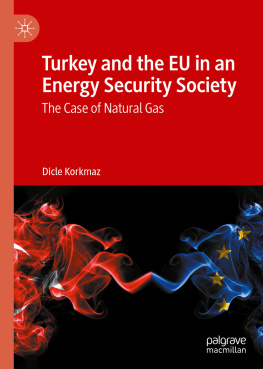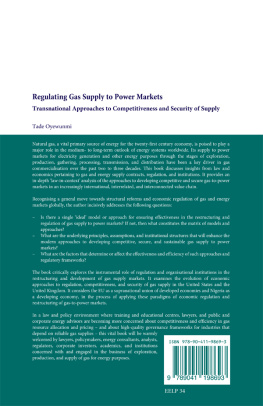Application of Anti-manipulation Law to EU Wholesale Energy Markets and Its Interplay with EU Competition Law
Energy and Environmental Law and Policy Series
VOLUME 35
Editor
General Editor: Professor Kurt Deketelaere, Professor of Law, University of Leuven, Belgium; Honorary Professor of Law, University of Dundee, UK; Honorary Chief of Staff, Flemish Government; Secretary-General, League of European Research Universities (LERU), Belgium. Kurts CV see www.kurtdeketelaere/en/kurt.
Introduction
Environmental protection and energy efficiency/security are important societal challenges. In order to tackle them, policy and legal frameworks are developed at national, regional and global level. Through study and best practices development, the challenges will prove to be solvable.
Contents/Subjects
Environment/Nature/Energy/Climate.
Objective
The aim of this series is to publish works of excellent quality that focus on the study of energy and environmental policy. Through this series the editors:
contribute to the improvement of the quality of energy/environmental law and policy in general and environmental quality and energy efficiency in particular; increase the access to environmental and energy information for academics, nongovernmental organizations, government institutions, and business; and
facilitate cooperation between academic and non-academic communities in the field of energy and environmental law and policy throughout the world.
Readership
Academics and practitioners in environmental and energy matters.
The titles published in this series are listed at the end of this volume.
Application of Anti-manipulation Law to EU Wholesale Energy Markets and Its Interplay with EU Competition Law
Huseyin Cagri Corlu

Published by:
Kluwer Law International B.V.
PO Box 316
2400 AH Alphen aan den Rijn The Netherlands
E-mail:
Website: lrus.wolterskluwer.com
Sold and distributed in North, Central and South America by:
Wolters Kluwer Legal & Regulatory U.S.
7201 McKinney Circle
Frederick, MD 21704
United States of America
Email:
Sold and distributed in all other countries by:
Air Business Subscriptions
Rockwood House
Haywards Heath
West Sussex
RH16 3DH
United Kingdom
Email:
Printed on acid-free paper.
ISBN 978-90-411-9603-3
e-Book: ISBN 978-90-411-9604-0
web-PDF: ISBN 978-90-411-9605-7
2018 Kluwer Law International BV, The Netherlands
All rights reserved. No part of this publication may be reproduced, stored in a retrieval system, or transmitted in any form or by any means, electronic, mechanical, photocopying, recording, or otherwise, without written permission from the publisher.
Permission to use this content must be obtained from the copyright owner. More information can be found at: lrus.wolterskluwer.com/policies/permissions-reprints-and-licensing
Printed in the United Kingdom.
Table of Contents
CHAPTER 1
The Legal Framework Applicable to EU Wholesale Energy Markets
CHAPTER 2
Anti-manipulation Law: Its Strengths and Weaknesses
CHAPTER 3
Manipulative Practices in Energy Markets in US Case Law
CHAPTER 4
Manipulation of EU Energy Markets: Experience and Prospects
CHAPTER 5
General Conclusions
Foreword
It is a great honour to have been given the chance to write this foreword after having supervised the PhD of Dr Huseyin Cagri Corlu on the topic of The Application of Anti-manipulation Law to EU Wholesale Energy Markets and Its Interplay with EU Competition Law. Huseyin was a charismatic and exceptional student to supervise, and he proved this by defending the PhD in an excellent way which resulted in him being awarded it with no corrections, i.e., with distinction (equivalent to summa cum laude).
This book draws from the assertion of the European Commission that competition is a prerequisite for the establishment of an integrated community-wide energy market and security of supply. It shows that the Commission strived to achieve this via the adoption of a series of regulatory packages and via the extensive use of competition law (e.g., Article 9 of 1/2003 Regulation, Commitment Decisions procedure) as well as by undertaking initiatives such as an investigation in the EU energy sectors to identify the factors that hamper the establishment of a well-functioning, competitive, EU-wide energy market. However, as the author discusses, the 2007 Energy Sector Inquiry results led to adoption of several regulatory measures including, inter alia, the adoption of REMIT 2011. The book extensively discusses and analyses REMIT with a specific focus on the prohibition of market manipulation. As the adoption of REMIT does not preclude the jurisdiction of the European Commission under EU competition law, the book strives to analyse the factors and circumstances that determine when and what market conduct can be subject to REMIT or EU Competition Law and in case of an overlap, what course of action should be followed without giving effect to issues of double jeopardy. Not least, it analyses and discusses in detail the relevant US and EU case laws and provides proposals to mitigate the uncertainties posed by REMIT.
The analysis is thorough and the research conducted exhaustive. This book will be a valuable tool to various readership audiences, ranging from research students in energy law, to legal practitioners, academics and members of the judiciary who will find in it an invaluable tool to help them interpret various competition law aspects of wholesale energy markets and further understand and help the further shaping of the law in this fascinating yet complex field.
Dr Kyriaki Noussia
Senior Lecturer in Law, University of Exeter, Law School Exeter, Devon, 27 March 2018
Preface
Of the findings, the European Commission established in its report on Energy Sector Inquiry, market manipulation constituted a major concern for the functioning and integrity of EU energy sectors. The Commission argued that the responsibility for high prices in wholesale energy markets could be attributed to manipulative practices of energy incumbents and the trust in the operation of operation of sector was largely compromised, due to these practices. Remedies, EU competition law provided, were considered as insufficient to resolve these shortcomings and thus should be supplemented with regulatory-based tools. The findings of the Energy Sector Inquiry and subsequent consultation documents by multiple EU institutions paved the way for the adoption of the Regulation on wholesale energy market integrity and transparency, REMIT, which incorporated into an anti-manipulation rule, specifically designed to prohibit and prosecute manipulative practices in EU wholesale energy markets. Nevertheless, as EU case law on market manipulation has yet to develop and there are uncertainties with respect to the concept of market manipulation. Furthermore REMIT does not preclude the jurisdiction of EU competition law, questions arise as to the scope and the extent of the application of this prohibition. Throughout its chapters, this book explores the scope of and the case law on market manipulation to determine what types of market practices are regarded as manipulative and thus prohibited under antimanipulation rules. It also focuses on the interplay between REMIT and EU competition law and evaluates factors and circumstances that determine when and what market misconduct can be subject to enforcement proceedings under both antimanipulation and antitrust rules. As the development of a single, coherent, rulebook that can be relied upon by market participant is fundamental for the functioning of EU wholesale energy markets, the book, finally, provides proposals and measures that can mitigate and resolve the legal uncertainties regarding the regulatory framework REMIT established.
Next page
